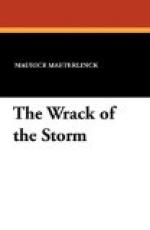“One of the surprises of our future will certainly be a return to beliefs and ideas long ago abandoned upon the mere assumption that they contained no truth—beliefs still called barbarous, pagan, mediaeval, by those who condemn them out of traditional habit. Year after year the researches of science afford us new proof that the savage, the barbarian, the idolater, the monk, each and all have arrived, by different paths, as near to some point of eternal truth as any thinker of the nineteenth century. We are now learning also, that the theories of the astrologers and of the alchemists were but partially, not totally, wrong. We have reason even to suppose that no dream of the invisible world has ever been dreamed, that no hypothesis of the unseen has ever been imagined—which future science will not prove to have contained some germ of reality."[6]
There are many things which might be added to these lines, notably all that the most recent of our sciences, metapsychics, is engaged in discovering with regard to the miraculous faculties of our subconsciousness.
But, to return more directly to what we were saying, was it not observed that, after the great battles of the Napoleonic era, the birth-rate increased in an extraordinary manner, as though the lives suddenly cut short in their prime were not really dead and were eager to be back again in our midst and complete their career? If we could follow with our eyes all that is happening in the spiritual world that rises above us on every side, we should no doubt see that it is the same with the moral force that seems to be lost on the field of slaughter. It knows where to go, it knows its goal, it does not hesitate. All that our wonderful dead relinquish they bequeath to us; and when they die for us, they leave us their lives not in any strained metaphorical sense, but in a very real and direct way. Virtue goes out of every man who falls while performing a deed of glory; and that virtue drops down upon us; and nothing of him is lost and nothing evaporates in the shock of a premature end. He gives us in one solitary and mighty stroke what he would have given us in a long life of duty and love. Death does not injure life; it is powerless against it. Life’s aggregate never changes. What death takes from those who fall enters into those who are left standing. The number of lamps grows less, but the flame rises higher. Death is in no wise the gainer so long as there are living men. The more it exercises its ravages, the more it increases the intensity of that which it cannot touch; the more it pursues its phantom victories, the better does it prove to us that man will end by conquering death.
FOOTNOTES:
[Footnote 6: Kokoro: Hints and Echoes of Japanese Life, chapter xiv., “Some thoughts about Ancestor-Worship.”]
* * * * *




